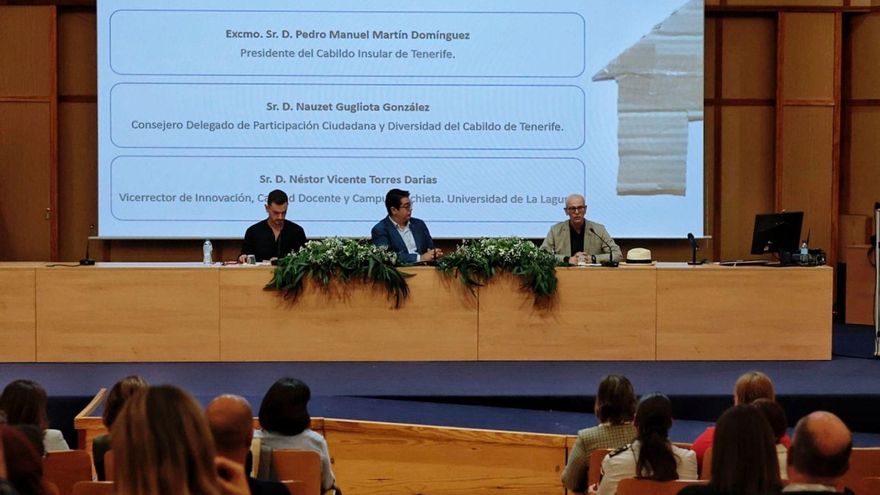
Homeless people are increasing exponentially in Tenerife. There are already more than 3,000 islanders in a situation of extreme residential exclusion and the figure has grown in recent months. A rebound of the phenomenon that, in addition, extends throughout the Island, from Santa Cruz de Tenerife –where the only public hostel on the Island is located– and La Laguna to the South and North. These are the two reasons why the Cabildo, together with the University of La Laguna (ULL), has organized a forum with the aim of mobilizing resources as well as discussing the orientation of public policies and possible island investments destined in 2023 to alleviate this situation. The first Participatory Sessions on Social Inclusion and Homelessness were held at the Guajara Campus with the inauguration by the island president, Pedro Martín. He was accompanied by the Councilor for Citizen Participation, Nauzet Gugliotta, and by the ULL’s Vice-Rector for Innovation, Néstor Vicente Torres.
The meeting aims to be a starting point to obtain an insular framework for coordinated action, organized and comprehensive, for the care of this group. The intention is to bring together all the social actors involved in this reality, from the public administration and third sector entities, to private companies. The response was positive with the presence of more than 200 people. Professionals, public administration technicians and representatives of humanitarian aid organizations, but also many students.
Diagnosis.
Ascensión Sioni Bacallado, insular director of Social Action Planning and Strategy of the Institute of Social and Socio-Sanitary Care (IASS) explains the diagnosis of this scourge. It is based on the results of the study on people in a situation of extreme residential exclusion in Tenerife 2021, carried out by Cáritas Diocesana. According to this report, residential exclusion affected 2,738 at the end of last year. They were already 1,000 more than in 2020, but they have increased. Both Martín and Gugliotta outline that they exceed 3,000. The social crisis caused by the pandemic triggered homelessness. This figure includes those who cannot access a house or keep it in decent conditions and live in substandard housing.
Basque Strategy.
The Forum has the presence of Marian Olabarrieta, Director of Social Services of the Basque Government, who developed in a speech the strategy for homeless people launched in Euskadi. A model that has given good results. A public system of structured dialogue in which all citizens have a sufficient level of protection.
“Not just give a roof.”
Pedro Martín emphasizes that “it is not just about giving a roof, we have to go further”. He considers it key to “analyze the problem and look for alternatives so that the people affected can regain their self-esteem and get their lives back on track.” He reflects: “Any of us can find themselves in the same situation.” He advocates “ending the invisibility of these people.” He recalls that the Cabildo allocates an annual contribution of 1,600,000 euros to finance various resources, both direct care and prevention of homelessness, with which in 2021 more than 3,800 people were served. He highlights the importance of this pioneering forum to “listen to opinions and experiences that help define new resources on the path to providing solutions.”
A constant job.
Nauzet Gugliotta values ”the work of the Cabildo to address the problem.” He considers that it has been done “with great sensitivity” from the perspective of a broad phenomenon, which affects a diverse population and through the reinforcement of coordination with other administrations and entities involved in care. He emphasizes the fact of “the participation” of people and entities “that have contributed their opinion.” In the forum there were representatives of entities from the third sector such as Don Bosco, Cáritas, Red Cross, Nuevo Futuro and Fundación Canaria el Buen Samaritano. Also from public administrations, especially municipalities.
«The ULL can do it».
Néstor Torres emphasizes the value of hosting these conferences at the ULL as a way of making visible that the educational institution is at the service of society and willing to contribute with all its resources to solving the problems of its environment. «At the University of La Laguna we can do it and we can contribute because research is done. Solvent and solid research, starting point to reach conclusions». In addition, he adds, «it is imbued with values that are shared with this project; solidarity, empathy, sensitivity towards others and care for the other».
Professionals and social agents related to homelessness care reflect together and advance in the design of a framework for coordinated and comprehensive action, which promotes the social and community inclusion of people in this situation. They are more and more.
Some keys to the future
In first person
The homeless speak
There were four round tables in the day. Three of them include the moment in which the homeless people explained their vital experience to the audience. An enlightening meeting with, among other groups, the students of the Social Work Degree at the ULL who had the fortune to learn with the best practical class.
Strategy
island coordination
Among the conclusions of the forum, after analyzing the situation and proposing intervention methodologies and procedures, there is one that marked a good part of the debate: the pertinent need to define a unified island strategy against homelessness and a space for coordination and advice.
Novelty
Public and private
This first monographic conference on homelessness in the Guajara Campus Lecture Hall, which the participants hope “will not be the last”, analyzed some novelties in the action against the problem. Among them, he highlighted public-private collaboration “as a specific tactic of care for homeless people.”















